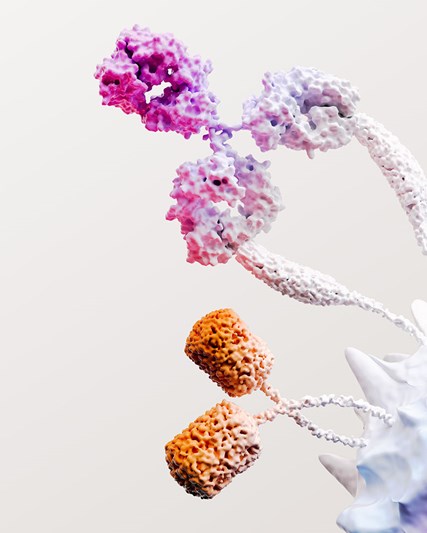Issued: London UK
For media and investors only
GSK presents new data at the Alzheimer's Association International Conference 2024
-
ZOSTER-122 retrospective study presented during Featured Research Session on shingles and dementia risk
-
Retrospective study observed statistically significant association between Shingrix vaccination and reduction of dementia risk, compared to Zostavax and Pneumovax 23, with further studies planned
-
Abstracts from GSK collaboration with Alector provide new genetic evidence supporting the AL101 therapeutic hypothesis and phase II trial in Alzheimer's disease
GSK plc (LSE/NYSE: GSK) today announced the presentation of four new abstracts at the Alzheimer’s Association International Conference (AAIC) being held in Philadelphia, PA from 28 July to 1 August 2024, contributing to early science in neurodegenerative diseases.
Headline data from ZOSTER-122
Today GSK is presenting results from the ZOSTER-122 retrospective, observational matched-cohort study in adults aged 50 years and over, which examines the potential association between Shingrix (Recombinant Zoster Vaccine or RZV) vaccination and reduced risk of dementia compared to two other vaccines.1 GSK’s abstract is being presented alongside five other abstracts in a Featured Research Session on shingles and dementia risk.
Tony Wood, Chief Scientific Officer, said: “The ZOSTER-122 retrospective study adds to the growing body of evidence that suggests an association between shingles vaccination and reduced risk of dementia. These are compelling early results, which we are investigating further with additional retrospective and mechanistic studies to advance the field.”2-9
Headline data show vaccination with either RZV or Zostavax (Zoster Vaccine Live or ZVL) was associated with statistically significant reductions in dementia risk compared to a control cohort vaccinated with Pneumovax 23 (PPSV23), another elective adult vaccine recommended for similar age groups:
- At three years: RZV was associated with a 24% reduced risk of dementia compared to PPSV23, and ZVL was associated with a 14% reduced risk compared to PPSV23.
- At five years: RZV was associated with a 20% reduced risk of dementia compared to PPSV23, and ZVL was associated with an 8% reduced risk compared to PPSV23.
The study also shows that RZV was associated with statistically significant reductions in dementia risk compared to ZVL:
- At three years: RZV was associated with a 27% reduced risk of dementia compared to ZVL.
- At five years: RZV was associated with a 23% reduced risk of dementia compared to ZVL.
A summary of ZOSTER-122 results is provided below.
| Comparison | Time Point | Risk reduction | Relative Risk (RR) [95% CI] | Cumulative Hazard of Dementia [95% CI] | Post-matching cohort size |
|---|---|---|---|---|---|
| RZV versus PPSV23 | 3 years | 24% | 0.76 [0.69, 0.84]; p<0.0001 | RZV: 0.007 [0.0065, 0.0075] PPSV23: 0.009 [0.0086, 0.0098] | 168,667 individuals in each group (1:1 matching) |
| 5 years | 20% | 0.80 [0.71, 0.90]; p<0.0005 | RZV: 0.014 [0.0124, 0.0147] PPSV23: 0.017 [0.0155, 0.0182] | ||
| ZVL versus PPSV23 | 3 years | 14% | 0.86 [95% CI: 0.86, 0.90]; p<0.0001 | ZVL: 0.011 [0.0105, 0.0112] PPSV23: 0.013 [0.0122, 0.0130) | 382,038 individuals in each group (1:1 matching) |
| 5 years | 8% | 0.92 [95% CI: 0.89, 0.95]; p<0.0001 | ZVL: 0.021 [0.0204, 0.0214] PPSV23: 0.023 [0.0221, 0.0232] | ||
| RZV versus ZVL | 3 years | 27% | 0.73 [95%CI: 0.60, 0.89]; p<0.005 | RZV: 0.005 [0.0041, 0.0056] ZVL: 0.007 [0.0058, 0.0075] | 45,851 individuals in each group (1:1 matching) |
| 5 years | 23% | 0.77 [95%CI: 0.64, 0.92]; p<0.005 | RZV: 0.010 [0.0084, 0.0110] ZVL: 0.013 [0.0112, 0.0140] | ||
| Note: Cumulative hazard describes the total accumulated risk of dementia in each cohort after a period of time (3 and 5 years in ZOSTER-122). | |||||
No studies to date have demonstrated a causal association between RZV vaccination and reduced risk of dementia, and RZV is not approved by any regulatory authority for the prevention of dementia.
Abstracts from GSK collaboration with Alector
GSK also presented three abstracts relating to its global immuno-neurology collaboration with Alector for progranulin-elevating anti-sortilin monoclonal antibodies (mAbs), including AL101 and AL001. AL101 is being investigated in an ongoing phase II study in Alzheimer’s disease. AL001 (latozinemab) recently received Breakthrough Therapy designation for frontotemporal dementia with a progranulin gene mutation (FTD-GRN), and the ongoing phase III trial investigating AL001 for the treatment of FTD-GRN completed enrolment in October 2023.
The abstracts featured genetic evidence, trial design and pre-clinical data supporting the progress of GSK’s research in immuno-neurology:
- “Genetic evidence supporting therapeutic hypothesis of increasing progranulin levels for Alzheimer’s disease”: Abstract presents genetic evidence across the allelic spectrum, strongly supporting the therapeutic hypothesis of increasing progranulin to reduce Alzheimer’s disease risk.
- “PROGRESS-AD: a phase II study to evaluate efficacy and safety of GSK4527226 (AL101), an anti-sortilin monoclonal antibody versus placebo, in patients with early Alzheimer's disease”: Abstract outlines PROGRESS-AD trial design which evaluates the effects of AL101 on slowing clinical decline in early Alzheimer’s disease patients, as measured by cognitive and functional assessments.
- “Using plasma biomarkers to distinguish TDP43 associated pathologies”: TDP43 pathology is a marker of various neurodegenerative diseases but has been challenging to evaluate using reliable biomarkers in the clinic. The abstract explores using readily deployable plasma biomarkers, such as GFAP:NfL measures, for identifying TDP43 pathology positive patients. These pre-clinical data could support recruitment for future clinical trials in neurodegenerative diseases.
About ZOSTER-122
ZOSTER-122 is an observational, retrospective matched-cohort study of adults aged 50 years and over, initiated to explore whether RZV vaccination is associated with a reduced risk of dementia, in line with previous studies demonstrating this association with ZVL vaccination.1,2
ZOSTER-122 utilised the Optum de-identified Electronic Health Record (Optum EHR) data set, which covers over 115 million lives, 2000 hospitals and 5000 clinics in the United States healthcare system. The study utilised de-identified records collected in the period between 1 October 2007 to 30 September 2023 and grouped cohorts defined by vaccine exposure who were recorded to have received the RZV, ZVL and/or PPSV23 vaccinations.
A machine-learning model was used to match individuals across 394 covariates captured in the health database, helping to control for dementia-associated risks like blood pressure, smoking status, preventive health service uptake and healthcare utilisation, therefore minimising the potential for “healthy vaccinee bias” across cohorts. A limitation of many retrospective observational studies, including ZOSTER-122, is that they may be affected by unmeasured confounding and therefore cannot establish causality.
About Shingrix
Recombinant Zoster Vaccine (or RZV) is a non-live, recombinant subunit vaccine indicated for the prevention of shingles in adults aged 50 years and over. It combines an antigen, glycoprotein E, with an adjuvant system, AS01B, and may help overcome the natural age-related decline in responses to immunisation that contributes to the challenge of protecting adults aged 50 and over from shingles.10-11 RZV is not indicated to prevent primary varicella infection (chickenpox). In several countries, RZV is also approved for adults aged 18 years or over at increased risk for shingles. The use of RZV should be in accordance with official recommendations and local product label.
Please refer to the Product Information for important dosage, administration, and safety information available at this link: https://www.ema.europa.eu/en/medicines/human/EPAR/shingrix.
About AL101
AL101 is an investigational human monoclonal antibody designed to elevate the level of progranulin, a regulator of immune activity in the brain with genetic links to multiple neurodegenerative disorders. Mutations that moderately reduce the expression levels of progranulin have been shown to increase the risk of developing Alzheimer’s disease and Parkinson’s disease. Increased progranulin levels have been demonstrated to be protective for these diseases in animal models. AL101 is currently being investigated in a phase II study in Alzheimer’s disease.
About GSK
GSK is a global biopharma company with a purpose to unite science, technology, and talent to get ahead of disease together. Find out more at gsk.com.
About Alector
Alector is a clinical stage biotechnology company pioneering immuno-neurology, a novel therapeutic approach for the treatment of neurodegenerative diseases. The Company is developing a broad portfolio of innate immune system programs, designed to functionally repair genetic mutations that cause dysfunction of the brain’s immune system and enable the rejuvenated immune cells to counteract emerging brain pathologies. Immuno-neurology targets immune dysfunction as a root cause of multiple pathologies that are drivers of degenerative brain disorders. The Company’s immuno-neurology product candidates are supported by biomarkers and target genetically defined patient populations in frontotemporal dementia and Alzheimer’s disease. This scientific approach is also the basis for the Company’s immuno-oncology programs. Alector is headquartered in South San Francisco, California. For additional information, please visit www.alector.com.
Cautionary statement regarding forward-looking statements
GSK cautions investors that any forward-looking statements or projections made by GSK, including those made in this announcement, are subject to risks and uncertainties that may cause actual results to differ materially from those projected. Such factors include, but are not limited to, those described under Item 3.D “Risk factors” in GSK’s Annual Report on Form 20-F for 2023, and GSK’s Q1 Results for 2024.
References
- Schwab P, et al. Recombinant zoster vaccine and reduced risk of dementia: matched-cohort study using large-scale electronic health records and machine learning methodology. Abstract presented at Alzheimer's Association International Conference (AAIC); 28 July - 1 August 2024, Philadelphia, PA.
- Eyting, M., et al. Causal evidence that herpes zoster vaccination prevents a proportion of dementia cases. medRxiv: the preprint server for health sciences. 2023.
- Wu, X., et al. Adult Vaccination as a Protective Factor for Dementia: A Meta-Analysis and Systematic Review of Population-Based Observational Studies. Frontiers in Immunology. 2022;13.
- Lophatananon, A., et al. The association of herpes zoster and influenza vaccinations with the risk of developing dementia: a population-based cohort study within the UK Clinical Practice Research Datalink. BMC Public Health. 2023;23(1):1903
- Harris, K., et al. The Impact of Routine Vaccinations on Alzheimer's Disease Risk in Persons 65 Years and Older: A Claims-Based Cohort Study using Propensity Score Matching. Journal of Alzheimer's Disease : JAD. 2023;95(2):703-18
- Schnier, C., et al. Reduced dementia incidence after varicella zoster vaccination in Wales 2013-2020. Alzheimer's & Dementia. 2022;8(1):e12293.
- Wiemken, T.L., et al. Comparison of rates of dementia among older adult recipients of two, one, or no vaccinations. Journal of the American Geriatrics Society. 2022;70(4):1157-68.
- Lophatananon, A., et al. Shingles, Zostavax vaccination and risk of developing dementia: a nested case-control study-results from the UK Biobank cohort. BMJ Open. 2021;11(10):e045871.
- Lehrer, S., et al. Herpes Zoster Vaccination Reduces Risk of Dementia. In Vivo. 2021;35(6):3271-5.
- Cunningham, AL, et al. Efficacy of the Herpes Zoster Subunit Vaccine in Adults 70 Years of Age or Older. New England Journal of Medicine. 2016;375(11):1019-32.
- The GSK proprietary AS01 adjuvant system contains QS-21 Stimulon® adjuvant licensed from Antigenics LLC, a wholly owned subsidiary of Agenus Inc. (NASDAQ: AGEN), MPL and liposomes.



